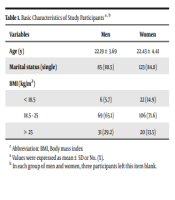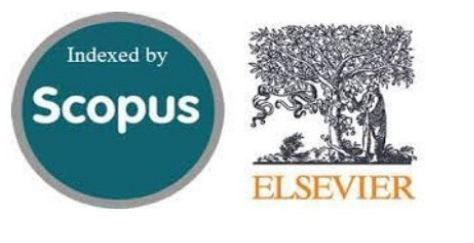Translation and Evaluation of the Reliability and Validity of Eating Disorder Inventory-3 Referral form Questionnaire Among Iranian University Students: A Cross-sectional Study
Keywords:
Validity, Reliability, Eating Disorder, Inventory, Iran, Psychiatry, SubscalesAbstract
Background: Undiagnosed eating disorders may lead to a life-threatening condition, then a validated and reliable tool that lets health providers use it for effective screening is a mandatory need. Objectives: This study aimed to assess the validity and reliability of the Persian version of the Eating Disorder Inventory-3 Referral Form (EDI-3 RF). Methods: In this cross-sectional study, 452 university students and employees were recruited by convenience sampling from the Iran University of Medical Sciences, Tehran, Iran. The content validity was assessed using the five specialists, and then the content validity index (CVI) and content validity ratio (CVR) was calculated separately. The reliability was measured with Cronbach’s alpha and test-retest. Results: Overall, 260 participants filled out the questionnaire completely. The mean age of participants was 22.34 ± 4.18 years. The mean weight was 64 kg (range: 40 - 115). This version of EDI-3 RF yields acceptable content validity and item correlation. According to the expert’s opinion, CVR was more than 0.99 for all inquiries. Also, the CVI for each item was greater than 0.79, which indicates the acceptable value of this index for different items in terms of relevance, clarity, and simplicity. Also, the face validity was approved according to participants’ and experts’ opinions. Cronbach’s alpha for measuring the three subscales of an eating disorder were acceptable (drive for thinness (DT) = 0.76 and 0.77, bulimia (B) = 0.71 and 0.72, and body dissatisfaction (BD) = 0.77 and 0.71, respectively). The correlation coefficient between two questionnaires was 0.48 (P < 0.01). The coefficient between the subscales and whole parts of this questionnaire was 0.58, 0.53, 0.66, 0.48, 0.34, and 0.43, respectively (P < 0.01). Conclusions: This questionnaire would be a beneficial self-response questionnaire, and because of its abbreviated format, it can be used as a screening and referral tool in the Persian population.
Downloads
References
1. American Psychiatric Association. Diagnostic and Statistical Manual of
Mental Disorders. 5th ed. Washington, D.C., USA: American Psychiatric
Association; 2013. https://doi.org/10.1176/appi.books.9780890425596.
2. Hambleton A, Pepin G, Le A, Maloney D, Touyz S; National Eating Disorder Research Consortium, et al. Psychiatric andmedical comorbidities of eating disorders: findings from a rapid review of the literature.
J Eat Disord. 2022;10(1):132. [PubMed ID: 36064606]. [PubMed Central
ID: PMC9442924]. https://doi.org/10.1186/s40337-022-00654-2.
3. McClelland J, Robinson L, Potterton R, Mountford V, Schmidt U. Symptom trajectories into eating disorders: A systematic review of longitudinal, nonclinical studies in children/adolescents. Eur Psychiatry. 2020;63(1). e60. [PubMed ID: 32450945]. [PubMed Central ID:
PMC7355161]. https://doi.org/10.1192/j.eurpsy.2020.55.
4. Lavender JM, Brown TA, Murray SB. Men, Muscles, and Eating Disorders: an Overview of Traditional and MuscularityOriented Disordered Eating. Curr Psychiatry Rep. 2017;19(6):32.
[PubMed ID: 28470486]. [PubMed Central ID: PMC5731454].
https://doi.org/10.1007/s11920-017-0787-5.
5. Stice E, Marti CN, Rohde P. Prevalence, incidence, impairment, and
course of the proposed DSM-5 eating disorder diagnoses in an 8-
year prospective community study of young women. J Abnorm Psychol. 2013;122(2):445–57. [PubMed ID: 23148784]. [PubMed Central ID:
PMC3980846]. https://doi.org/10.1037/a0030679.
6. Rindahl K. A systematic review of literature on school screening for
eating disorders. Int J Health Sci. 2017;5(3):1–9.
7. Cooke R, Sawyer SM. Eating disorders in adolescence. An approach
to diagnosis and management. Aust Fam Physician. 2004;33(1-2):27–31.
[PubMed ID: 14988957].
8. Herpertz-Dahlmann B, Dempfle A, Konrad K, Klasen F, RavensSieberer U, Bella study group. Eating disorder symptoms do not
just disappear: the implications of adolescent eating-disordered behaviour for body weight and mental health in young adulthood.
Eur Child Adolesc Psychiatry. 2015;24(6):675–84. [PubMed ID: 25209691].
https://doi.org/10.1007/s00787-014-0610-3.
9. Anderson DA, Lundgren JD, Shapiro JR, Paulosky CA. Assessment
of eating disorders: review and recommendations for clinical use. Behav Modif. 2004;28(6):763–82. [PubMed ID: 15383685].
https://doi.org/10.1177/0145445503259851.
10. Garner DM. Eating disorder inventory-3 (EDI-3). Lutz, USA: Psychological
Assessment Resources; 1987.
11. Clausen L, Rosenvinge JH, Friborg O, Rokkedal K. Validating the Eating
Disorder Inventory-3 (EDI-3): A Comparison Between 561 Female Eating Disorders Patients and 878 Females from the General Population.
J Psychopathol Behav Assess. 2011;33(1):101–10. [PubMed ID: 21472023].
[PubMed Central ID: PMC3044826]. https://doi.org/10.1007/s10862-
010-9207-4.
12. Cumella EJ. Review of the eating disorder inventory-3. J Pers Assess.
2006;87(1).
13. Nyman-Carlsson E, Engstrom I, Norring C, Nevonen L. Eating Disorder Inventory-3, validation in Swedish patients with eating
disorders, psychiatric outpatients and a normal control sample. Nord J Psychiatry. 2015;69(2):142–51. [PubMed ID: 25434459].
https://doi.org/10.3109/08039488.2014.949305.
14. Dadgostar H, Nedjat S,Dadgostar E, Soleimany G. Translation and Evaluation of the Reliability and Validity of Eating Disorder Inventory -3
Questionnaire Among Iranian University Students. Asian J Sports Med.
2017;In Press(In Press). https://doi.org/10.5812/asjsm.13950.
15. Farrokhzad S, Nedjat S, Kamangar F, Kamali M, Malekzadeh R, Pourshams A. Validity and reliability of a questionnaire designed to assess
risk factors of pancreatic cancer in Iran. Arch Iran Med. 2014;17(2):102–
5. [PubMed ID: 24527969].
16. Garner DM. Eating disorder inventory-3 (EDI-3). 1. Lutz, USA: Psychological Assessment Resources; 2004.
17. Stice E, Telch CF, Rizvi SL. Development and validation of the Eating
Disorder Diagnostic Scale: a brief self-report measure of anorexia,
bulimia, and binge-eating disorder. Psychol Assess. 2000;12(2):123–31.
[PubMed ID: 10887758]. https://doi.org/10.1037//1040-3590.12.2.123.
18. Segura-Garcia C, Aloi M, Rania M, Ciambrone P, Palmieri A, Pugliese V,
et al. Ability of EDI-2 and EDI-3 to correctly identify patients and subjects at risk for eating disorders. Eat Behav. 2015;19:20–3. [PubMed ID:
26162592]. https://doi.org/10.1016/j.eatbeh.2015.06.010.
19. Lee S, Lee AM, Leung T. Cross-cultural validity of the Eating Disorder
Inventory: a study of Chinese patients with eating disorders in Hong
Kong. Int J Eat Disord. 1998;23(2):177–88. [PubMed ID: 9503243].
https://doi.org/10.1002/(sici)1098-108x(199803)23:2<177::aideat8>3.0.co;2-h.
20. Robbeson JG, Kruger HS, Wright HH. Disordered Eating Behavior,
Body Image, and Energy Status of Female Student Dancers. Int J
Sport Nutr Exerc Metab. 2015;25(4):344–52. [

Downloads
Additional Files
Published
Submitted
Revised
Accepted
Issue
Section
License

This work is licensed under a Creative Commons Attribution-NonCommercial 4.0 International License.







